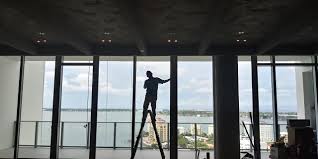Commercial window tinting represents a comprehensive solution for improving building performance, combining multiple benefits ranging from energy efficiency to enhanced security. Let’s explore its key aspects and advantages.
Types and Applications
- Sun Control Films – Reduces heat gain by up to 79%
- Minimizes UV exposure
- Maintains natural lighting while controlling glare
- Security Films – Provides shatterproof protection
- Offers ballistic resistance
- Enhances building safety
- Privacy Solutions – Available in various styles (frosted, mirrored, blackout)
- Protects sensitive information
- Creates private meeting spaces
- Decorative Options – Mimics expensive glass treatments
- Customizable designs and patterns
- Enhances building aesthetics
Key Benefits
- Energy Efficiency – Significant reduction in heating and cooling costs
- ROI typically achieved within 3 years
- Minimizes temperature variations across spaces
- Interior Protection – Blocks up to 99% of UV rays
- Prevents furniture and flooring fading
- Protects sensitive equipment
- Employee Comfort – Reduces screen glare
- Maintains natural light benefits
- Improves overall workspace environment
- Security Enhancement – Makes break-ins more difficult
- Holds shattered glass together
- Protects occupants from flying debris
Investment Value
According to the U.S. Department of Energy, commercial window film ranks among the top energy conservation technologies for businesses 0:7. This investment offers multiple returns:
- Reduced utility bills
- Extended asset lifespan
- Improved property value
- Enhanced building security
Real-World Applications
Commercial window tinting serves various sectors:
- Office buildings
- Retail storefronts
- Educational facilities
- Government buildings
- Healthcare facilities
Implementation Considerations
When considering commercial window tinting, evaluate:
- Building orientation and sun exposure
- Existing window conditions
- Specific business needs (privacy/security/energy efficiency)
- Local climate conditions
- Budget constraints
Professional installation ensures optimal performance and warranty validity. Consult with experienced providers who can assess your specific situation and recommend the most suitable solutions for your commercial space.

### Types and Applications
1. **Sun Control Films** – Reduces heat gain by up to 79%
– Minimizes UV exposure
– Maintains natural lighting while controlling glare
2. **Security Films** – Provides shatterproof protection
– Offers ballistic resistance
– Enhances building safety
3. **Privacy Solutions** – Available in various styles (frosted, mirrored, blackout)
– Protects sensitive information
– Creates private meeting spaces
4. **Decorative Options** – Mimics expensive glass treatments
– Customizable designs and patterns
– Enhances building aesthetics
### Key Benefits
1. **Energy Efficiency** – Significant reduction in heating and cooling costs
– ROI typically achieved within 3 years
– Minimizes temperature variations across spaces
2. **Interior Protection** – Blocks up to 99% of UV rays
– Prevents furniture and flooring fading
– Protects sensitive equipment
3. **Employee Comfort** – Reduces screen glare
– Maintains natural light benefits
– Improves overall workspace environment
4. **Security Enhancement** – Makes break-ins more difficult
– Holds shattered glass together
– Protects occupants from flying debris
### Investment Value
According to the U.S. Department of Energy, commercial window film ranks among the top energy conservation technologies for businesses . This investment offers multiple returns:
– Reduced utility bills
– Extended asset lifespan
– Improved property value
– Enhanced building security
### Real-World Applications
Commercial window tinting serves various sectors:
– Office buildings
– Retail storefronts
– Educational facilities
– Government buildings
– Healthcare facilities
### Implementation Considerations
When considering commercial window tinting, evaluate:
1. Building orientation and sun exposure
2. Existing window conditions
3. Specific business needs (privacy/security/energy efficiency)
4. Local climate conditions
5. Budget constraints
Professional installation ensures optimal performance and warranty validity. Consult with experienced providers who can assess your specific situation and recommend the most suitable solutions for your commercial space.